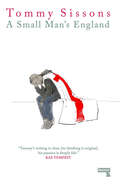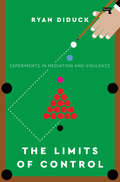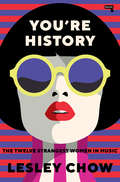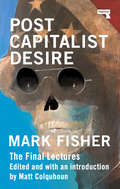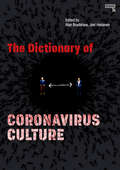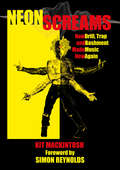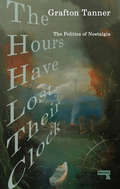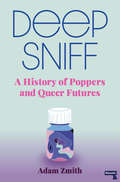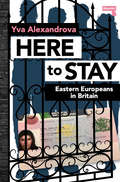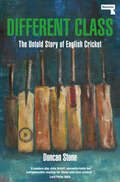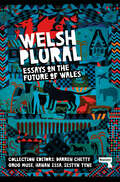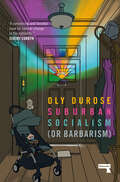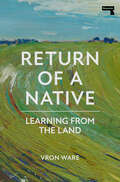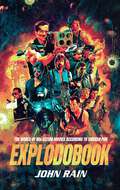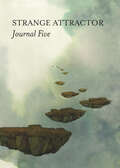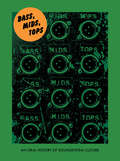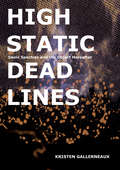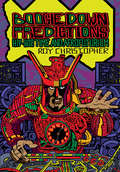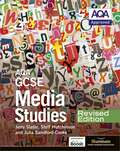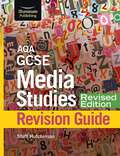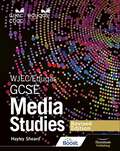- Table View
- List View
A Small Man's England
by Tommy SissonsAn exploration of white working-class English men, showing how and why some have been captured by the far-right and what the left can do about it.IS THE WHITE WORKING CLASS RIGHT-WING? AND IS IT RIGHT-WING TO EVEN SPEAK OF A "WHITE WORKING CLASS"? In recent decades, as class consciousness has been suppressed and eroded, many white working-class men have turned their backs on the left in favour of the right and the far-right. Why is this? A Small Man's England is a polemic aimed at the structures of hierarchy that ceaselessly maintain power across Britain and elsewhere, and a call for multicultural solidarity amongst the working class. In analysing the roles that class, race, masculinity and nationality play in neoliberal Britain, Sissons offers a solution to the indoctrination of white working-class English men by the right and the far-right, and explores how working-class people can collectively shape a "Common England" -- a country based on equality and justice for all.
The Limits of Control: Experiments in Mediation and Virulence
by Ryan DiduckRyan Diduck turns his attention to control societies and their protocols in the wake of the global COVID-19 pandemic. What are the political implications of government measures to combat Coronavirus?The end of the world as we know it is no longer imaginary.Severe acute respiratory syndrome Coronavirus 2 (also known as SARS-CoV-2 or COVID-19) is a potent virus that is upturning nearly every aspect of life on earth. But the novel Coronavirus is more than just a virus. It is a marketplace and media event, too, broadcasting at speed, oscillating against the transmission of its mediations. Ultimately, COVID-19 is the pretext upon which nations around the world have enacted social controls of varying severity, strictly limiting the communication, movement, and daily activities of billions of people. This could be a moment of overwhelming consolidation of capital. Or it could further reveal the cracks in a system which has exacerbated the coronavirus pandemic. We are rapidly approaching the limits of control. In the tradition of William S. Burroughs, Naomi Klein, Mark Fisher, and other key theorists of discipline and jurisdiction, The Limits of Control offers a timely new analysis of control societies, and a sibylline roadmap for living together in a hypervirulent world. What we imagine from now on has never mattered more.
New Atlantis and Selections from the Sylva Sylvarum
by Francis BaconFrancis Bacon's classic technological utopia brought to life for the modern sonic arts. In the early seventeenth century, at the very end of his life, the English statesman and philosopher Francis Bacon wrote a utopian fable called New Atlantis, containing an uncanny presentiment of twentieth-century electronic music. Now, four hundred years ago, music writer Robert Barry digs into the significance of that tale for the history of music, media, science and the senses. New Atlantis marked a significant turning point in the history of utopian literature -- not to mention the pre-history of science fiction, and even modern science itself. At the heart of the island paradise stumbled upon by Bacon's stranded sailors is a research institute called Bensalem where the locals practice "all sounds and their generation". The passage was sufficiently inspiring that Daphne Oram quoted it in full and pinned it to the wall of the newly opened BBC Radiophonic Workshop in 1957. Newly re-united with extracts from the Sylva Sylvarum, a notebook of real experiments that New Atlantis originally came bound with in the seventeenth century, this new publication seeks to bring Bacon's ideas to life for a new generation of artists and scholars engaged in the sonic arts, media archeology, and science studies. New Atlantis is presented with a brand new introduction by author and musician Robert Barry, which lays out the continuing relevance of Bacon's utopia for the place of sound and technology in the arts to this day.
You're History: The Twelve Strangest Women in Music
by Lesley ChowRaucous, sensual and sublime: how twelve pioneering female artists rewrote the rules of pop.From Kate Bush to Nicki Minaj, from Janet Jackson to TLC and Taylor Swift, pop's greatest female pioneers are simply strange: smashing notions of taste and decorum, and replacing them with new ideals of pleasure. Instead of rehashing biographies, Lesley Chow dives deep into the music of these groundbreaking performers, identifying the ecstatic moments in their songs and finding out what makes them unique. You're History is a love letter to pop's most singular achievements, celebrating the innovations of women who are still critically underrated. It's a ride that includes tributes to Chaka Khan, Rihanna, Neneh Cherry, Sade, Shakespears Sister, Azealia Banks, and many more...
Postcapitalist Desire: The Final Lectures
by Mark FisherA collection of transcripts from Mark Fisher's final series of lectures at Goldsmiths, University of London, in late 2016.Edited with an introduction by Matt Colquhoun, this collection of lecture notes and transcriptions reveals acclaimed writer and blogger Mark Fisher in his element -- the classroom -- outlining a project that Fisher's death left so bittersweetly unfinished.Beginning with that most fundamental of questions -- "Do we really want what we say we want?" -- Fisher explores the relationship between desire and capitalism, and wonders what new forms of desire we might still excavate from the past, present, and future. From the emergence and failure of the counterculture in the 1970s to the continued development of his left-accelerationist line of thinking, this volume charts a tragically interrupted course for thinking about the raising of a new kind of consciousness, and the cultural and political implications of doing so.For Fisher, this process of consciousness raising was always, fundamentally, psychedelic -- just not in the way that we might think...
The Dictionary of Coronavirus Culture
by Alan Bradshaw and Joel HietanenThe Dictionary of Coronavirus Culture presents an A-Z of life in lockdown. Taking everyday terms that capture the lived experience of lockdown — like chocolate, streaming, ageing, health, clapping, social distancing, dystopia, and frontline workers — and discussing them with a range of writers, theorists, and academics, it provides unusually accessible and friendly analysis of our shared historic moment. With contributions from Lynne Segal, Jo Grady, Kate Soper, Stefano Harney, and many more, The Dictionary of Coronavirus Culture is designed to help us come to terms with what COVID-19 and the associated lockdowns mean for us, and the world around us.
Neon Screams: How Drill, Trap and Bashment Made Music New Again
by Kit MackintoshExamining new genres from the UK and across the Atlantic, including mumble rap, Brooklyn drill, UK drill, trap dancehall and Afrobeats, Neon Screams explores the dystopias and dissociative transcendence offered by this boundary-pushing music.With a foreword by Simon Reynolds, Neon Screams explores the plethora of new street genres that have emerged at the turn of the 2020s. Neon Screams is a manifesto, a rallying cry for the new musical futurism. Taking street music&’s embrace of Auto-Tune in the late 2000s as his starting point, Kit Mackintosh launches you through a whirlwind tour of the last decade of cutting-edge music, championing the modern genres still uncovering the sonic impossible, from mumble rap to drill to Afrobeats, bashment and beyond. Beginning where most future music chronicles end, Mackintosh establishes a new pantheon of pioneers and innovators. Offering dizzying insights into the likes of Future, Young Thug, Migos and Vybz Kartel, Neon Screams is conceptual weaponry to use against all those who say music isn&’t what it used to be. Part polemic, part synesthetic possession, Neon Screams is essential reading for everyone eager to uncover the new frontiers of future music.
The Hours Have Lost Their Clock: The Politics of Nostalgia
by Grafton TannerThe Hours Have Lost Their Clock charts the rise of nostalgia in an era knocked out of time.In The Hours Have Lost Their Clock, Grafton Tanner charts the rise of nostalgia in an era knocked out of time. Nostalgia is the defining emotion of our age. Political leaders promise a return to yesteryear. Old movies are remade and cancelled series are rebooted. Veterans reenact past wars, while the displaced across the world long for home. But who is behind this collective ache for a home in the past? Do we need to eliminate nostalgia, or just cultivate it better? And what is at stake if we make the wrong choice? Moving from the fight over Confederate monuments to the birth of homeland security to the mourning of species extinction, Grafton Tanner traces nostalgia&’s ascent in the twenty-first century, revealing its power as both a consequence of our unstable time and a defense against it. With little faith in a future of climate change and economic anxiety, many have turned to nostalgia to weather the present, while powerful elites exploit it for their own gain. An exploration into the politics of loss and yearning, The Hours Have Lost Their Clock is an urgent call to take nostalgia seriously. The very future depends on it.
Deep Sniff: A History of Poppers and Queer Futures
by Adam ZmithAdam Zmith reveals the long history of the quick rush from sniffing poppers.3, 2, 1... inhale, deep. From the Victorian infirmary and the sex clubs of the 1970s, poppers vapour has released the queer potential inside us all. This is the intriguing story of how poppers wafted out of the lab and into gay bars, corner shops, bedrooms and porn supercuts. Blending historical research with wry observation, Adam Zmith explores the cultural forces and improbable connections behind the power of poppers. What emerges is not just a history of pub raids, viral panics and pecs the size of dinner plates. It is a collection of fresh and provocative ideas about identity, sex, utopia, capitalism, law, freedom and the bodies that we use to experience the world. In Deep Sniff, what starts as a thoughtful enquiry into poppers becomes a manifesto for pleasure.
Here to Stay: Eastern Europeans in Britain
by Yva AlexandrovaBulgarian writer and immigration expert Yva Alexandrova tells the story of Eastern European migrants in the UK, and argues for a more just, humane and compassionate immigration system.The arrival of Eastern European migrants to the UK after the enlargement of the EU in 2004 and 2011 was one of the key social transformations of the last twenty years in this country. Yet whilst reporting on this has focused mainly on the impact of immigration on the UK, and has been constructed of racist vox-pops and sensationalist political debate, there has been very little research on, and even less insight into, the experiences of the migrants themselves. Drawing on personal experience, interviews and research, Yva Alexandrova tells hers and the stories of other Eastern Europeans that came to the UK, and shows how attitudes to immigration have changed in the last twenty years in the wake of Brexit and a new wave of nativism that has swept across Britain. She argues that both the right and the left have made political compromises on migration, and makes a passionate and vivid argument for fair and just migration that is grounded in people&’s lived experiences and aspirations, and not in political expediency, as integral to progressive movements today. At a time when racism, xenophobia and nationalism dominate political discussion in the UK and around the world, Left Out: Eastern Europeans in Britain tells the stories of people who are rarely seen in debates on immigration.
Different Class: The Untold Story of English Cricket
by Duncan StoneIn telling the story of cricket from the bottom up, Different Class demonstrates how the "quintessentially English" game has done more to divide, rather than unite, the English.In 1963, the West Indian Marxist C.L.R. James posed the deceptively benign question: "What do they know of cricket, who only cricket know?"A challenge to the public to re-consider cricket and its meaning by placing the game in its true social, political and economic context, James was, all too subtly, attempting to counter the game&’s orthodox history that, he argued, had played a key role in the formation of national culture. As a consequence, he failed, and the history of cricket in England has retained the same stresses and lineaments as it did a century ago — until now.In examining recreational rather than professional (first-class) cricket, Different Class does not simply challenge the widely accepted orthodoxy of English cricket, it demonstrates how the values and belief systems at its heart were, under the guise of amateurism, intentionally developed in order to divide the English along class lines at every level of the game. If the creation of opposing class-based cricket cultures in the North and South of England grew out of this process, the institutional structures developed by those in charge of English cricket continue to discriminate. But, as much as the exclusion of Black and South Asian cricketers from the recreational mainstream is the most obvious example, it is social class that remains the greatest barrier to participation in what used to be the national game.
Welsh (Plural): Essays on the Future of Wales
by Darren Chetty, Hanan Issa, Grug Muse and Iestyn TyneSome of the most exciting writers in and from Wales consider the future of Wales and the UK and their place in it.What does it mean to imagine Wales and &‘The Welsh&’ as something both distinct and inclusive? In Welsh (Plural), some of the foremost Welsh writers consider the future of Wales and their place in it. For many people, Wales brings to mind the same old collection of images – if it&’s not rugby, sheep and leeks, it&’s the 3 Cs: castles, coal, and choirs. Heritage, mining and the church are indeed integral parts of Welsh culture. But what of the other stories that point us toward a Welsh future? In this anthology of essays, authors offer imaginative, radical perspectives on the future of Wales as they take us beyond the clichés and binaries that so often shape thinking about Wales and Welshness.Includes essays from Charlotte Williams (A Tolerant Nation?), Joe Dunthorne (Submarine, The Adulterants), Niall Griffiths (Sheepshagger, Broken Ghost), Rabab Ghazoul (Gentle / Radical Turner Prize Nominee), Mike Parker (On the Red Hill), Martin Johnes (Wales Since 1939, Wales: England&’s Colony?), Kandace Siobhan Walker (2019 Guardian 4th Estate Prize Winner), Gary Raymond (Golden Orphans, Wales Arts Review, BBC Wales), Darren Chetty (The Good Immigrant), Andy Welch (The Guardian), Marvin Thompson (Winner 2021 UK Poetry Prize), Durre Shahwar (Where I&’m Coming From), Hanan Issa (My Body Can House Two Hearts), Dan Evans (Desolation Radio), Shaheen Sutton, Morgan Owen, Iestyn Tyne, Grug Muse and Cerys Hafana.
Suburban Socialism: (Or Barbarism)
by Oly DuroseReflecting on his own landslide loss in conservative suburbia, Oly Durose asks how we can transform the urban outskirts of the status quo into centres of transformative change.In December 2019, Oly Durose lost by over 25,000 votes as the Labour Party Parliamentary Candidate for Brentwood & Ongar. Revealing what it&’s like to stand on a socialist platform in one of the safest Conservative seats in the UK, this book makes the case for socialism in the suburbs, unveils the challenges of its electoral realisation, and proposes a strategic revolution required to win.Suburban Socialism asks what it would be like to bring white picket fences under collective control instead. To convince suburbanites of this radical alternative inside the electoral arena, this book argues that we must revolutionise our strategy outside of it. From the aftermath of the Industrial Revolution to the shockwaves of the metropolitan youthquake, socialism has predominantly been framed as an urban struggle. Identifying the possibilities for suburban resistance, this book offers a more geographically inclusive invitation to the socialist struggle, revealing why the suburban struggle is global in scale. Turning a suburb that shares from a hopeless fantasy into an electoral reality, Suburban Socialism illustrates why the path to socialism around the world is through the heterogenous suburban terrain.
A Nation of Shopkeepers: The Unstoppable Rise of the Petite Bourgeoisie
by Dan EvansA Nation of Shopkeepers explores the unstoppable rise of the petite-bourgeoisie, one of the most powerful, but underexplored, classes in modern society.The petite-bourgeoisie — the insecure class between the working class and the bourgeoisie — is hugely significant within global politics. Yet it remains something of a mystery.Initially identified as a powerful political force by theorists like Marx and Poulantzas, the petit-bourgeoisie was expected to decline, as small businesses and small property were gradually swallowed up by monopoly capitalism. Yet, far from disappearing, structural changes to the global economy under neoliberalism have instead grown the petite-bourgeoisie, and the individualist values associated with it have been popularized by a society which fetishizes "aspiration", home ownership and entrepreneurship. So why has this happened?A Nation of Shopkeepers sheds a light on this mysterious class, exploring the class structure of contemporary Britain and the growth of the petite-bourgeoisie following Thatcherism. It shows how the rise of home ownership, small landlordism and radical changes to the world of work have increasingly inculcated values of petite-bourgeois individualism; how popular culture has promoted and reproduced values of aspiration and conspicuous consumption that militate against socialist organizing; and, most importantly, what the unstoppable rise of the petit-bourgeoisie means for the left.
Return of a Native: Learning from the Land
by Vron WareFrom a fixed point in the middle of English nowhere, Vron Ware takes you through time and space to explain why transcending the urban-rural divide is integral to the future of the planet.Rural England is a mythic space, a complex canvas on which people from many different backgrounds project all kinds of fantasies, prejudices, desires and fears. This book seeks to challenge many of these ideas, showing how the artificial divide between rural and urban works to conceal the underlying relationship between these two fundamental poles of human settlement.This investigation of rurality is oriented from a fixed point in north-west Hampshire, marked by a signpost that points in four directions to two towns, four villages and two hamlets. Through stories, interviews and reportage gathered over two decades, the book demolishes tired notions of rural England that cast it as a separate realm of existence, whether marooned in a perpetual time-warp, or reduced to a refuge for the retired, wealthy urbanites, extreme nature-lovers, and, more recently, anyone tired of waiting out the pandemic in towns and cities. It poses two simple questions: what does the word rural mean today? What will it mean tomorrow?The author is an ambivalent native, held captive to the land by an umbilical cord but always on the verge of fleeing home to the city. She writes from a feminist, postcolonial standpoint that is alert to the slow violence of historical processes taking place over many centuries; enslavement, colonialism, industrialisation, globalisation. Both argument and narrative are propelled by the urgent need to reconsider the concept of &‘countryside&’ in the context of the climate emergency and the patent collapse of ecosystems due to intensive farming which has poisoned the land.
Explodobook: The World of 80s Action Movies According to Smersh Pod
by John RainThe 1980s. A time of fear: fear of the unknown, fear of your neighbours, fear of drugs, fear of sex, fear of strangers, fear of videos, and the very real fear that the world would end at any moment in an awful, and very sudden, nuclear attack. However, in those times of turmoil and worry, there was a comfort that soothed the mind, and acted as a quiet balm: action movies. Video shops were bursting at the seams with rampant gunfire, sex, drugs, rock, roll, cars on fire, people on fire, guns, bombs, and people dressed in army fatigues (and that was just the staff). Heroes were born shrouded in fire and violent revenge, they were not only armed with guns, but also red-hot quips, that served as a muscly arm around the shoulder, and a wink that everything was going to be okay. So thank you Arnold, Sylvester, Sigourney, Bruce, Eddie, Charles, Patrick, Mel, Chuck and everyone else that made it happen. You saved the world, in your own inimitable way. Join John Rain, the author of the critically-acclaimed Thunderbook: The World of Bond According to Smersh Pod, as he examines a choice selection of the greatest action movies from the decade when the explosion was king.
Strange Attractor Journal Five
by Mark Pilkington Jamie SutcliffeThe return of the Strange Attractor Journal, offering a characteristically eclectic collection of high weirdness from the margins of culture.After seven years of silence, the acclaimed Strange Attractor Journal returns with a characteristically eclectic collection of high weirdness from the margins of culture. Covering previously uncharted regions of history, anthropology, art, literature, architecture, science, and magic since 2004, each Journal has presented new and unprecedented research into areas that scholarship has all too often ignored.Featuring essays from academics, artists, enthusiasts, and sorcerers, Journal Five explores matters including the folklore of foghorns; the occult origins of the dissident surrealist secret society the Acéphale; the pleasures of heathen falconry; the dark cosmological mysteries of Bremen's Haus Atlantis; a provisional taxonomy of animals with human faces; a twentieth-century crucifixion on Hampstead Heath, and an unpublished horror script by David MacGillivray and Ken Hollings.Journal Five sees Strange Attractor continuing in its mission to celebrate unpopular culture.Join us.ContributorsNadia Choucha, William Fowler, Jeremy Harte, Ken Hollings, Christopher Josiffe, Phil Legard, David MacGillivray, Karen Russo, Robert J. Wallis, Dan Wilson, E. H. Wormwood
Bass, Mids, Tops: An Oral History of Sound System Culture
by Joe Muggs Brian David StevensAn oral history of the UK's soundsystem culture, featuring interviews with Dubmaster Dennis Bovell, Skream, Youth, Norman Jay MBE, Adrian Sherwood, Mala, and others.In the years following the arrival of the Windrush generation, the UK's soundsystem culture would become the most important influence on contemporary pop music since rock and roll. Pumped through towering, home-built speakers, often directly onto the thronged streets of events like the Notting Hill Carnival, the pulsating bass lines of reggae, dub, rave, jungle, trip hop, dubstep, and grime have shaped the worlds of several generations of British youth culture but have often been overlooked by historians obsessed with swinging London, punk, and Britpop.This oral history, consisting of new interviews conducted by respected dance music writer Joe Muggs, and accompanied by dramatic portraits by Brian David Stevens, presents the story of the bassline of Britain, in the words of those who lived and shaped it. Features interviews with Dubmaster Dennis Bovell, Norman Jay MPE, Youth, Adrian Sherwood, Skream, Rinse FM's Sarah Lockhart and many others.
High Static, Dead Lines: Sonic Spectres & the Object Hereafter
by Kristen GallerneauxA literary mix tape that explores the entwined boundaries between sound, material culture, landscape and esoteric belief.Trees rigged up to the wireless radio heavens. A fax machine used to decode the language of hurricanes. A broadcast ghost that hijacked a television station to terrorize a city. A failed computer factory in the desert with a slap-back echo resounding into ruin.In High Static, Dead Lines, media historian and artist Kristen Gallerneaux weaves a literary mix tape that explores the entwined boundaries between sound, material culture, landscape, and esoteric belief. Essays and fictocritical interludes are arranged to evoke a network of ley lines for the &“sonic spectre&” to travel through—a hypothetical presence that manifests itself as an invisible layer of noise alongside the conventional histories of technological artifacts.The objects and stories within span from the mid-nineteenth century to the present day, touching upon military, communications, and cultural history. A connective thread is the recurring presence of sound—audible, self-generative, and remembered—charting the contentious sonic histories of paranormal culture.
Boogie Down Predictions: Hip-Hop, Time, and Afrofuturism
by Kodwo Eshun Steven Shaviro Rasheeda PhillipsEssays that explore the connections between time, representation, and identity within hip-hop culture."This book, edited by Roy Christopher, is a moment. It is the deconstructed sample, the researched lyrical metaphors, the aha moment on the way to hip-hop enlightenment. Hip-hop permeates our world, and yet it is continually misunderstood. Hip-hop's intersections with Afrofuturism and science fiction provide fascinating touchpoints that enable us to see our todays and tomorrows. This book can be, for the curious, a window into a hip-hop-infused Alter Destiny--a journey whose spaceship you embarked on some time ago. Are you engaging this work from the gaze of the future? Are you the data thief sailing into the past to U-turn to the now? Or are you the unborn child prepping to build the next universe? No, you're the superhero. Enjoy the journey."--from the introduction by Ytasha L. WomackThrough essays by some of hip-hop's most interesting thinkers, theorists, journalists, writers, emcees, and DJs, Boogie Down Predictions embarks on a quest to understand the connections between time, representation, and identity within hip-hop culture and what that means for the culture at large. Introduced by Ytasha L. Womack, author of Afrofuturism: The World of Black Sci-Fi and Fantasy Culture, this book explores these temporalities, possible pasts, and further futures from a diverse, multilayered, interdisciplinary perspective.
AQA GCSE Media Studies – Revised Edition
by Jerry Slater Julia Sandford-Cooke Steff HutchinsonApproved by AQA. The AQA GCSE Media Studies Student Book has been revised and updated to reflect the latest amendments to the specification. This accessible and engaging resource will support students through their GCSE Media Studies course.What's new in the Revised Edition?- Coverage of the new close study products for assessment from 2023 onwards, including:Black Widow (film - media industries)How You Like That by Blackpink (music video - media industries and media audiences)KISS Breakfast (radio - media industries and audiences)His Dark Materials: The City of Magpies (television programme - all four areas of the theoretical framework)The social media and online output of Marcus Rashford (online, social and participatory media - all four areas of the theoretical framework)- New examples of contemporary media products across a range of forms.- Updated sections on media contexts to reflect recent developments in culture and society.- Up-to-date statistics and information about media industries and audiences- New activities to reinforce students' knowledge and understanding.What have we retained?- Highly visual and engaging design.- Detailed coverage of all areas of the specification, supported by highly illustrated examples.- Exploration of the theoretical framework of Media Studies, applied to a range of media forms and products.- Dedicated chapter on the Non-Exam Assessment element of the specification provides clear guidance on how students will be assessed.- Additional online exam guidance chapter introduces students to practice questions and the assessment objectives.- A variety of activities and extension tasks to help students broaden their knowledge and understanding and encourage independent learning.
AQA GCSE Media Studies Revision Guide - Revised Edition
by Steff HutchinsonThe AQA GCSE Media Studies Revision Guide has been revised and updated to reflect the latest amendments to the specification. This accessible and engaging resource will support students throughout their revision for the GCSE Media Studies assessments.What's new in the Revised Edition?- Coverage of the new close study products for assessment from 2023 onwards, including:Black Widow (film - media industries)How You Like That by Blackpink (music video - media industries and media audiences)KISS Breakfast (radio - media industries and audiences)His Dark Materials: The City of Magpies (television programme - all four areas of the theoretical framework)The social media and online output of Marcus Rashford (online, social and participatory media - all four areas of the theoretical framework)The new magazine and newspaper editions for assessment in 2023- Updated information on media contexts to reflect recent developments in culture and society.- Up-to-date statistics and information about media industries and audiences.What have we retained?- Highly visual and engaging design.- Detailed coverage of all areas of the specification, supported by highly illustrated examples.- Exploration of each area of the theoretical framework of Media Studies, applied to a range of media forms and products.- A dedicated chapter on analysis covering the skills required to analyse both previously unseen products and the close study products.- Exam guidance chapter to support students with their preparation and techniques for each of the two question papers.- A variety of knowledge check tasks and short questions to help students' retrieval practice.
WJEC/Eduqas GCSE Media Studies Student Book – Revised Edition
by Hayley SheardThe popular WJEC/Eduqas GCSE Media Studies Student Book has been revised and updated to reflect the latest amendments to the specifications. It covers the new set products for assessment from 2021 and includes the new set products added for assessment in 2024.Endorsed by WJEC/Eduqas, this accessible and engaging resource will support students through their GCSE Media Studies course.The Revised Edition provides:- New examples of contemporary media products across a range of forms.- Updated sections on media contexts to reflect recent developments in culture and society.- Up-to-date statistics and information about media industries and audiences.- New activities to reinforce students' knowledge and understanding.- Up-to-date information about the exam components including practice questions to help students with the skills they need for assessment.- Highly visual and engaging design.- Detailed coverage of all areas of the specification, supported by highly illustrated examples.- Exploration of the theoretical framework of Media Studies, applied to a range of media forms and products.- A dedicated chapter on the Non-Exam Assessment element of the specification providing clear guidance on how students will be assessed.- Exam guidance chapter to introduce students to practice questions and the assessment objectives.- A variety of activities and extension tasks to help students broaden their knowledge and understanding and encourage independent learning.
2 Weeks to Feeling Great: Because, seriously, who has the time? – THE SUNDAY TIMES BESTSELLER (2 Weeks Series)
by Gabriela PeacockThe Sunday Times Bestseller'The game-changing nutritionist ripping up the weight-loss rule book.' - You Magazine'Gabriela's tips on how to achieve a great relationship with your body are all in this book!' - EVA HERZIGOVÁ'The cool-girl, real-world guide to nutrition and more. Sane, smart and funny.' - LAURA BAILEY'I had no idea feeling great was going to be this easy.' - JODIE KIDD2 Weeks to Feeling Great is nutritionist Gabriela Peacock's comprehensive guide to health and wellbeing aimed at busy people who may not have the time - or inclination - to commit to strict rules that are not compatible with real life and instead focuses on what is achievable. It includes two detailed 14-day programmes on intermittent fasting, scientifically proven to be the most effective method of safely reaching a healthy weight. Covering everything from improving sleep to rebalancing hormones and increasing energy, the easy-to-remember tips and recommendations require minimal effort but deliver significant results. Gabriela also looks at other lifestyle factors, in addition to diet, that affect health - from household and beauty products to reducing the use of plastics. The bottom line is, you don't have to be perfect in order to feel and look better.
2 Weeks to Feeling Great: Because, seriously, who has the time? – THE SUNDAY TIMES BESTSELLER (2 Weeks Series)
by Gabriela PeacockThe Sunday Times Bestseller'The game-changing nutritionist ripping up the weight-loss rule book.' - You Magazine'Gabriela's tips on how to achieve a great relationship with your body are all in this book!' - EVA HERZIGOVÁ'The cool-girl, real-world guide to nutrition and more. Sane, smart and funny.' - LAURA BAILEY'I had no idea feeling great was going to be this easy.' - JODIE KIDD2 Weeks to Feeling Great is nutritionist Gabriela Peacock's comprehensive guide to health and wellbeing aimed at busy people who may not have the time - or inclination - to commit to strict rules that are not compatible with real life and instead focuses on what is achievable. It includes two detailed 14-day programmes on intermittent fasting, scientifically proven to be the most effective method of safely reaching a healthy weight. Covering everything from improving sleep to rebalancing hormones and increasing energy, the easy-to-remember tips and recommendations require minimal effort but deliver significant results. Gabriela also looks at other lifestyle factors, in addition to diet, that affect health - from household and beauty products to reducing the use of plastics. The bottom line is, you don't have to be perfect in order to feel and look better.
